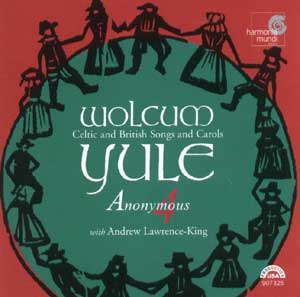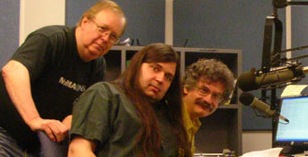
I first wrote and posted this two years ago, but maybe it will lighten the mood as everybody in the Northeast freaks out about their travel plans and the current and impending meteorological conditions. Stay safe out there.
A Visit From J.S. Bach
By Galen H. Brown, with apologies to Henry Livingston, Jr.
‘Twas the night before Christmas, when all through the city
The critics were trying their best to be witty;
They printed their lists of the past year’s best fare,
In hopes that their trendy young readers would care;
But the readers were nestled all snug in their beds,
While vacuous pop idols danced in their heads;
And the Maestro in PJs, and I in my drawers,
Had just settled in to examine some scores,
When out on the lawn, such cacaphonous sound,
I sprang from my desk thinking Zorn was in town.
I rushed to the window, allegro con brio,
Tore open the shutters — I just had to see! Oh,
The moon on the breast of the new-fallen snow
Gave the lustre of mid-day to objects below,
When, what should my wondering eyes linger over,
But an old harpsichord and eight ghostly composers,
With an old kappelmeister conducting the flock –
I knew in a moment it had to be Bach.
More rapid than Valkyries, onward they came,
And he whistled, and shouted, and called them by name;
“Now, Mozart! now, Lassus! now, Schoenberg and Dvorak!
On, Cage! on Beethoven! on, Haydn and Bartok!
To the dominant seven! To suspended six-four!
Now dash away! dash away! appoggiatur’!”
As dry leaves that before the wild hurricane fly,
When they meet with an obstacle, mount to the sky;
So off to a new key they all modulated,
For Bach would leave no variation unstated.
A caseura, and then on the roof could be heard
A cadence resolved with a picardy third.
As I drew in my head, and was turning around,
Down the chimney old J.S. Bach came with a bound.
He was dressed up for Weimar in 1710
And his fingers were stained with the ink from his pen;
An un-finished score could be seen to protrude
From his pocket — the title said “Die Kunst der Fugue.”
His eyes—how they twinkled with genius – none finer!
He did, after all, write the Mass in B Minor.
His mouth was a droll as a tonicization,
His wig was a white as unspoiled glaciation;
He carried a record of naughty and niceness –
That list was as long as the Bach Werke Verzeichnis!
His belly looked like it could use a supporter
And shook when he laughed, like a Schwarzwalder Kirschtorte.
He was chubby and plump, a well tempered old master,
And I laughed when I saw him, then wished I’d thought faster;
A wink, and a line from a two-part invention,
Soon showed me that I should feel no apprehension;
He spoke not a word, but went straight to composing,
A Musical Offering – it looked quite imposing,
Then humming some bars from the St. Matthew Passion,
He rose up the chimney in a glorious fashion;
He sprang to the keys, raised his hands to the sky
And away they all flew, at Allegro Assai,
But I heard him exclaim, ere he drove out of sight,
“Happy Christmas to all, and to all a good-night.”
 Corey Dargel’s remarkable “theatrical song cycle” Removable Parts is being reprised at the HERE Arts Center. The run started yesterday and goes through Sunday (Jan 7-11). The show, which is performed by Corey Dargel (voice) and Kathleen Supové (piano), is a sort of cabaret show about Body Integrity Identity Disorder which, in a strange and wonderful way, ends up dealing with questions of love, the self, and of what “normal” really means. I saw and reviewed the show when it was premiered in September 2007, and I loved it.
Corey Dargel’s remarkable “theatrical song cycle” Removable Parts is being reprised at the HERE Arts Center. The run started yesterday and goes through Sunday (Jan 7-11). The show, which is performed by Corey Dargel (voice) and Kathleen Supové (piano), is a sort of cabaret show about Body Integrity Identity Disorder which, in a strange and wonderful way, ends up dealing with questions of love, the self, and of what “normal” really means. I saw and reviewed the show when it was premiered in September 2007, and I loved it.
 A little palette-cleanser to shift our focus away from stimulating discussions of academe – after all, school is only out for a short while – what ‘holiday’ music do you admire?
A little palette-cleanser to shift our focus away from stimulating discussions of academe – after all, school is only out for a short while – what ‘holiday’ music do you admire? And so it came to pass that our Gaucho Amigo Marvin Rosen was abidin’ over his flock in a starry meadow high in the Cuspadores when an angel appeared unto him and said: “Marvin, remember last year when you did that fabulous 24-hour music marathon on
And so it came to pass that our Gaucho Amigo Marvin Rosen was abidin’ over his flock in a starry meadow high in the Cuspadores when an angel appeared unto him and said: “Marvin, remember last year when you did that fabulous 24-hour music marathon on 